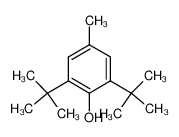Butylated Hydroxytoluene

Product Description
Butylated hydroxytoluene (BHT) is a lipophilic organic compound, chemically a derivative of phenol, that is useful for its antioxidant properties.
Product:
Butylated Hydroxytoluene
CAS:
128-37-0
Synonym:
2,6-ditert-butyl-4-methylphenol; 2,6-Di-tert-butyl-p-cresol; Butylhydroxytoluene
Structure:

Typical Characteristics
Appearance
White crystals or crystalline powder
Boiling point
265 °C
Density
1.048 g/cm3
Flash Point
127 °C
Melting point
69 - 73 °C
Molecular Weight
220.35
Odor
Slight, phenolic odor
Purity
≥ 99.0 %
Refractive index
1.4859
Uses, Applications & Markets
Key applications
get a quote
We Offer Butylated Hydroxytoluene
in various grades
A few of the grades available are listed below:



Butylated Hydroxytoluene used in many
industry applications
Butylated hydroxytoluene (BHT) is a chemical compound with various industrial and commercial applications. Here's a list of some of its uses:
- Antioxidant in Food: BHT is commonly used as a food additive to prevent oxidation and extend the shelf life of fats, oils, and processed foods. It helps inhibit the formation of rancidity and off-flavors caused by exposure to oxygen.
- Preservative in Cosmetics: BHT is used in cosmetics and personal care products as a preservative to prevent oxidation and spoilage. It helps maintain the stability and efficacy of creams, lotions, lipsticks, and other beauty products.
- Antioxidant in Pharmaceuticals: BHT is added to pharmaceutical formulations as an antioxidant to protect drugs and vitamins from degradation caused by exposure to air and light. It helps maintain the potency and stability of medications over time.
- Rubber Industry: BHT is used as an antioxidant and stabilizer in the rubber industry to prevent degradation and premature aging of rubber products. It helps protect tires, hoses, seals, and other rubber components from oxidation and UV-induced damage.
- Industrial Lubricants: BHT is added to industrial lubricants, such as hydraulic fluids, gear oils, and metalworking fluids, to enhance their oxidative stability and prolong their service life. It helps prevent the formation of sludge and deposits in lubrication systems.
- Plastics and Polymers: BHT is used as an antioxidant in plastics and polymers to prevent discoloration, embrittlement, and degradation during processing and storage. It helps maintain the mechanical properties and appearance of plastic materials.
- Fuel Additive: BHT is sometimes added to gasoline and diesel fuels as an antioxidant to inhibit the formation of gum and varnish deposits in fuel systems. It helps improve fuel stability and combustion efficiency, reducing engine deposits and emissions.
- Printing Inks: BHT is used as an antioxidant in printing inks to prevent oxidation and drying problems during the printing process. It helps maintain ink flow and color stability, ensuring consistent print quality and performance.
- Textile Industry: BHT is used as an antioxidant and stabilizer in textile processing, particularly in the production of synthetic fibers and fabrics. It helps prevent yellowing, degradation, and loss of strength in textiles exposed to light and heat.
- Adhesives and Sealants: BHT is added to adhesives, sealants, and caulks to improve their resistance to oxidation and environmental degradation. It helps extend the service life and durability of bonded materials in construction and industrial applications.